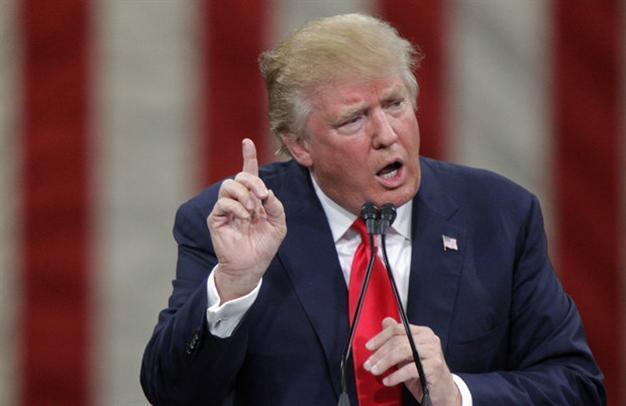Trump tries to pull back from support for Muslim database
WASHINGTON - The Associated Press

Republican presidential candidate Donald Trump speaks during a campaign stop Monday, Nov. 16, 2015, in Knoxville, Tenn. AP photo
Donald Trump is trying to back away from his support for a government database to track Muslims in the United States, an idea that drew sharp rebukes from his Republican presidential rivals and disbelief from legal experts.
Former Florida Gov. Jeb Bush called the prospect of a registry "abhorrent." Florida Sen. Marco Rubio said the idea was "unnecessary" and not something Americans would support. Texas Sen. Ted Cruz, who has largely avoided criticizing Trump throughout the 2016 campaign, said, "I'm not a fan of government registries of American citizens."
The first reference to a database came in a Trump interview with Yahoo News published Nov. 19. When asked about requiring Muslims to register in a database or carry a form of special identification noting their religion, Trump said, "We're going to have to look at a lot of things very closely."
Trump was pressed on the idea of a registry by an NBC News reporter Nov. 19 evening. Asked if there should be a database system for tracking Muslims in the United States, Trump said, "There should be a lot of systems, beyond databases." The reporter asked if that was something Trump would put in place as president. Trump replied: "I would certainly implement that. Absolutely."
Trump also told the reporter that Muslims would "have to be" registered.
In an interview on Fox News Channel on Nov. 20 evening, Trump tried to clarify his position. "I want a watch list for the Syrian refugees that (President Barack) Obama's going to let in if we don't stop him as Republicans," he said.
He also said he had had trouble hearing the NBC reporter's questions.
He addressed the issue during a rally in Alabama on Nov. 21, telling a crowd that reports on his previous statements were inaccurate. But he also voiced support for additional surveillance, both of arriving refugees and certain mosques.
"So here's the story just to set it clear: I want surveillance of these people. I want surveillance if we have to and I don't care," said Trump. "I want surveillance of certain mosques, OK."
The attacks in Paris that killed 130 people and wounded hundreds more have raised fears in the U.S. and prompted calls for new restrictions on refugees fleeing war-torn Syria.
The House of Representatives passed legislation this past week essentially barring Syrian and Iraqi refugees from the United States. It's unclear whether the Senate could get enough votes to override a threatened veto by President Barack Obama.
Civil liberties experts said a database for Muslims would be unconstitutional on several counts. The libertarian Cato Institute's Ilya Shapiro said the idea violates basic privacy and liberty rights.
Marci Hamilton, a Yeshiva University legal expert on religious liberty, said requiring Muslims to register appears to be a clear violation of the Constitution's protection of religious freedom.
Democratic front-runner Hillary Rodham Clinton, at a Tennessee rally Nov. 20 evening, said, "Mr. Trump has attacked Mexican immigrants, he's attacked women and now he's attacking Muslim Americans. At some point you have to ask yourself, is that the kind of country we are?"
Ben Carson, the retired neurosurgeon who has challenged Trump's lead in the Republican race, said the U.S. should have a database on "every foreigner who comes into this country," but he rejected the idea of tracking U.S. citizens based on their religion.
Carson said he would support government monitoring of "a mosque or any church or any organization or any school or any press corps where there was a lot radicalization and things that were anti-American."
